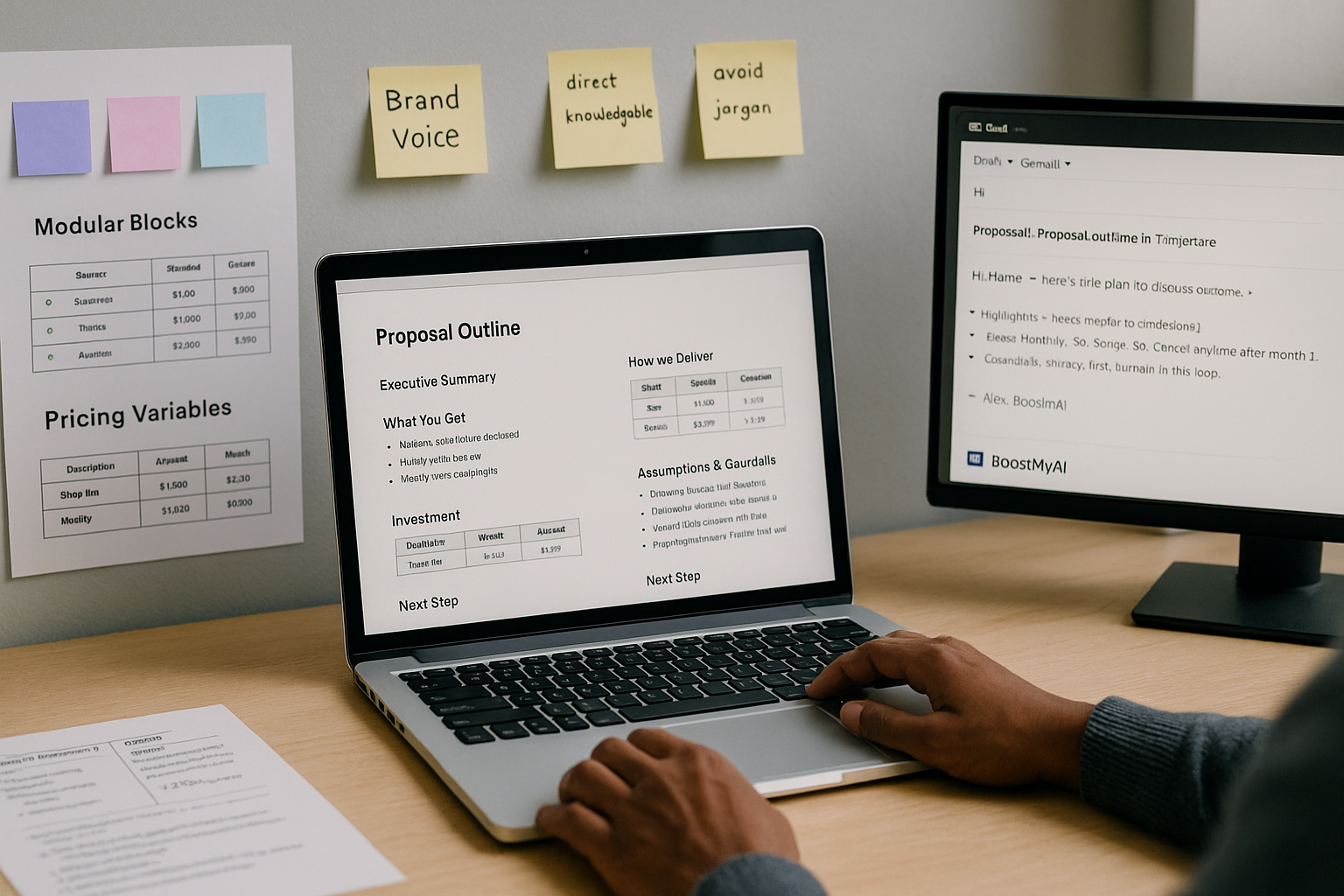How to Build a Quote/Proposal Assistant That Writes Like You
Stop writing proposals from scratch. Build a Quote/Proposal Assistant that speaks in your voice, snaps together scope/timeline blocks, auto-prices with guardrails, routes approvals, and ships a polished PDF in minutes. Faster drafts, tighter math, on-brand every time.

Outcome: on-brand proposals in minutes
The playbook below turns your proposals into a fast, consistent system that speaks in your voice, pulls the right blocks, prices correctly, routes for approval, and ships as a PDF or email—without you babysitting every draft.
1) Create your Brand Voice File (the “how we talk” layer)
This is the compass the assistant uses before it writes a single sentence.
What to include
- Tone & style: direct, friendly, punchy; avoid buzzwords; use second person (“you”)
- Positioning: who we serve, primary value, proof points
- Phrases to use/avoid: “plain-English ROI,” avoid “synergy,” etc.
- Formatting rules: headings, bullet density, callouts, signature block
- Examples: 2–3 redlined proposals (good vs. not-us)
Example (YAML or JSON works):
brand_voice:
tone: "plain-spoken, confident, Gen X concise"
persona: "ops-minded AI consultancy for small businesses"
value_props: ["faster ops", "lower costs", "practical AI adoption"]
do_say: ["playbook", "guardrails", "measurable"]
dont_say: ["cutting-edge synergy", "paradigm-shifting"]
formatting:
headings: "H2 > H3"
bullets_per_section: 3-6
callouts: "bold + italic for key numbers"
examples:
- good_url: "internal://proposal-good.pdf"
- bad_url: "internal://proposal-bad.pdf"
2) Build Modular Blocks (plug-and-play content)
Think Lego, not novels. Each block is short, single-purpose, and versioned.
Core block types
- Scope: what’s included/excluded (per package)
- Approach/Method: how you do it (1–2 paragraphs)
- Timeline: start → milestones → delivery
- Proof: case blurb, metrics, testimonial
- Risks & Assumptions: what must be true
- Legal Lite: MSA reference, IP notes, termination
Example block
{
"id": "scope-ai-inbox-v1",
"title": "Scope: AI Inbox Pilot",
"use_when": ["lead_gen", "support_inbox"],
"includes": [
"Set up shared inbox assistant with guardrails",
"10-day pilot, 100 sample messages",
"Weekly review + tune prompts"
],
"excludes": ["Custom integrations beyond Gmail/Outlook"]
}
3) Define Pricing Variables (no more manual math)
Turn pricing into parameters your assistant can calculate safely.
Inputs to capture
- Package (Starter/Pro/Custom)
- Seats / volumes / SKUs
- One-time vs monthly
- Discounts & approval thresholds
- Taxes/fees rules by region
Example
{
"pricing_model": {
"starter": {"monthly": 1500, "setup": 1000, "limit_messages": 1000},
"pro": {"monthly": 3500, "setup": 2500, "limit_messages": 5000}
},
"variables": {
"messages": 3200,
"chosen_plan": "pro",
"discount_pct": 10
},
"rules": {
"auto_discount_max_pct": 10,
"manager_required_over": 20000
}
}
4) Approvals & Guardrails (the “don’t let me get sued” layer)
Automate checks before anything leaves your house.
Automated gates
- Price floor: block drafts below margin X%
- Scope mismatch: flag if block set conflicts (e.g., “pilot” + “24/7 SLA”)
- Legal tags: add data-processing addendum when PII present
- Brand voice lint: reject banned phrases
Human approvals
- Sales: pricing > $20K or discount > 10%
- Legal: new logo/likeness, custom IP clauses
- Ops: timeline under 2 weeks
5) Draft → PDF/Email (push-button packaging)
The assistant assembles the blocks, applies voice, fills pricing, inserts your visuals, and exports to your preferred wrappers.
Outputs
- Proposal PDF: cover → summary → scope → timeline → price → next steps
- Email draft: tight summary + CTA + calendar link
- Editable doc: for last-mile tweaks
Email skeleton
Subject: Proposal: <Outcome> in <Timeframe>
Hi <Name> — here’s the plan to <business outcome>.
Highlights:
• Start <date>; first win by <milestone>.
• Fixed monthly: $X; setup: $Y; cancel anytime after month 1.
• Guardrails: privacy-first, human-in-the-loop.
PDF attached. Want me to pencil in <Day/Time> for a walkthrough?
— Alex, BoostMyAI
Putting It Together (flow)
- Intake: client type, goals, constraints → auto-select recommended blocks
- Compose: assistant drafts with brand voice + merges blocks
- Price: compute from variables; apply rules/discounts
- Check: run guardrails; route approvals if triggered
- Export: PDF + email; log to CRM
Minimum Viable Build (1–2 days)
- Day 1: voice file v1, 10 core blocks, pricing JSON, simple approval rules
- Day 2: generate 3 proposal templates, wire CRM sync, PDF/email export
Prompts That Work (steal these)
- “Using
brand_voice.yamland these blocks: scope-ai-inbox-v1, timeline-standard-v2, write a 1-page proposal for a 10-day pilot. Keep bullets tight, avoid buzzwords, include a measurable next step.” - “Draft the email summary in 110 words or less, with a single CTA to book a call. Do not summarize internal pricing mechanics.”
- “Run the price engine with plan=pro, messages=3200, discount=10%. Flag any rule violations, then render a pricing table.”
KPIs to Track
- Time to draft (target: <10 minutes)
- Close rate vs baseline
- Discount % by segment
- Revisions per deal
- Proposal → meeting booking rate
Common Pitfalls (and fixes)
- Bloated blocks: Keep them short and versioned; retire low-performers.
- Voice drift: Re-train the voice file monthly using winners only.
- Pricing chaos: Lock variables; require approvals for custom math.
- PDF purgatory: Always keep an editable source (DOCX/HTML) behind the PDF.
Ready-to-Use Section Outline (copy/paste)
- Executive Summary – outcome in one paragraph
- What You Get – 5–7 bullets (scope)
- How We Deliver – short method + timeline
- Investment – table with setup, monthly, options
- Assumptions & Guardrails – 5 bullets
- Next Step – CTA with calendar link
Why This Works
You remove creativity from the parts that shouldn’t vary (voice, structure, math) and keep creativity where it closes (fit, proof, CTA). The result: every proposal sounds like your best one—just faster.
Want it built?
We can stand this up for your team, wire it into your CRM, and have you shipping on-brand proposals this week. Contact us today to get started!
